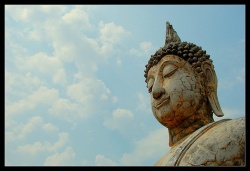Difference between revisions of "Hrī"
Jump to navigation
Jump to search
(Created page with "Hri (Sanskrit, also hri; Pali: hiri; Tibetan Wylie: ngo tsha shes pa) is a Buddhist term translated as "self-respect" or "conscientiousness". It is defined as the attitude tak...") |
|||
| (7 intermediate revisions by 3 users not shown) | |||
| Line 1: | Line 1: | ||
| − | + | [[File:Buddhasky.jpg|thumb|250px|]] | |
| − | |||
| − | : | + | |
| + | [[Hri]] ; [[Moral shame]], in [[sense]] of being ashamed to do wrong. | ||
| + | |||
| + | (See [[Conscience]], [[Sin]].) | ||
| + | |||
| + | |||
| + | [[Hri]] ([[Sanskrit]], also [[hri]]; [[Pali]]: [[hiri]]; [[Tibetan]] [[Wylie]]: [[ngo tsha shes pa]]) is a [[Buddhist]] term translated as "[[self-respect]]" or "{{Wiki|conscientiousness}}". It is defined as the [[attitude]] taking earnest [[care]] with regard to ones [[actions]] and refraining from non-[[virtuous]] [[actions]]. It is one of the [[virtuous]] [[mental factors]] within the [[Abhidharma]] teachings. | ||
| + | |||
| + | |||
| + | The [[Abhidharma-samuccaya]] states: | ||
| + | |||
| + | |||
| + | : What is [[hri]]? It is to avoid what is objectionable as far as I see it and its function is to provide a basis for refraining from non-[[virtuous]] [[actions]]. | ||
| + | |||
==Alternative Translations== | ==Alternative Translations== | ||
| − | |||
| − | |||
| − | |||
| − | |||
| − | |||
| − | {{ | + | * [[self-respect]] - {{Wiki|Herbert Guenther}}, [[Dzigar Kongtrul Rinpoche]], [[Rangjung Yeshe]] wiki |
| + | |||
| + | * [[conscientiousness]] - {{Wiki|Erik Pema Kunsang}} | ||
| + | |||
| + | * [[moral self-dignity]] - [[Alexander Berzin]] | ||
| + | |||
| + | * [[sense of shame]] - [[Rangjung Yeshe]] wiki | ||
| + | |||
| + | * [[dignity]] | ||
| + | {{W}} | ||
[[Category:Buddhist Terms]] | [[Category:Buddhist Terms]] | ||
| + | [[Category:Buddhist psychology]] | ||
Latest revision as of 18:15, 15 November 2020
Hri ; Moral shame, in sense of being ashamed to do wrong.
(See Conscience, Sin.)
Hri (Sanskrit, also hri; Pali: hiri; Tibetan Wylie: ngo tsha shes pa) is a Buddhist term translated as "self-respect" or "conscientiousness". It is defined as the attitude taking earnest care with regard to ones actions and refraining from non-virtuous actions. It is one of the virtuous mental factors within the Abhidharma teachings.
The Abhidharma-samuccaya states:
- What is hri? It is to avoid what is objectionable as far as I see it and its function is to provide a basis for refraining from non-virtuous actions.
Alternative Translations
- sense of shame - Rangjung Yeshe wiki
